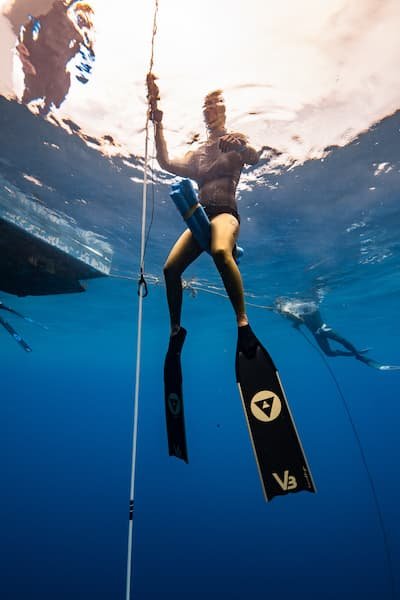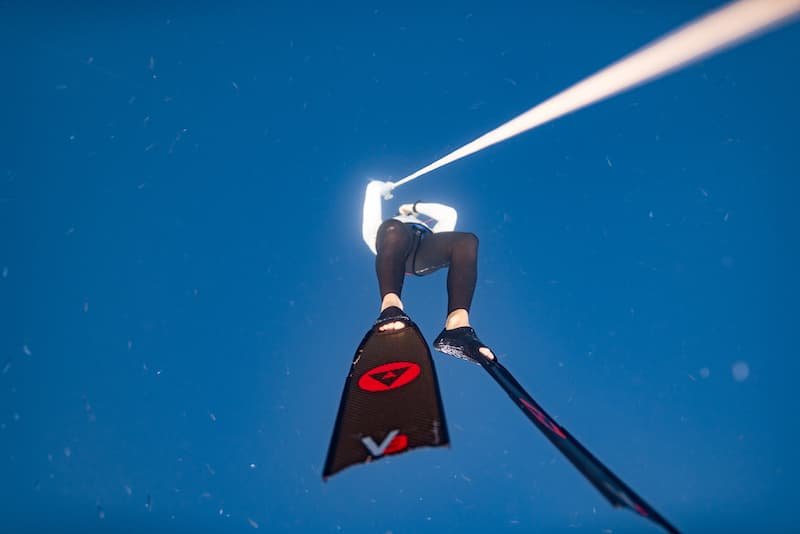Many spearos worldwide underestimate the importance of attending freediving courses for spearfishing. However, they are mistaken. What they fail to realize is that participating in these courses can enhance their diving skills, ensure their safety, and ultimately lead to greater success in catching fish. Here are 3 things I learned during my first freediving course.
In the context of rescue and safety protocols, I believe that a significant focus for freedivers, including myself, my students, and my fellow classmates, is the ability to effectively handle rescue scenarios. This skill is emphasized throughout freediving courses, particularly in the foundational level one course. The primary goal is to learn streamlined and efficient methods for performing rescues and ensuring safety. This involves assessing and monitoring various factors such as timing, style, and the physical condition of one's dive buddy during their dive. It is crucial to recognize signs of stress, and understand their capabilities, dive times, and preferred depths.
Most rescue situations typically occur above water and involve conditions like Loss of Motor Control (LMC) or blackout, where individuals are physically breathing but unconscious due to the body's protective response. During the course, we extensively cover these protective reflexes and methods to identify signs and symptoms in our dive buddies. While statistically most rescues happen above water, we also address underwater blackouts and provide guidance on performing rescues in such situations, both underwater and on the surface. Additionally, we discuss procedures for handling buddy separation scenarios, whether caused by current or other factors. This includes strategies for locating and effectively rescuing a missing buddy, whether they are lost on the surface or during a dive.

It is quite common to come across spearos who have not undergone proper freediving courses. Instead, they rely on fragmented information they gather from social media platforms like Instagram, Facebook, or YouTube, often following popular figures. Unfortunately, they mistakenly believe they have mastered freediving and can seamlessly incorporate it into their spearfishing pursuits. However, in challenging locations such as Hawaii, where fish shooting is notably difficult, the circumstances are far from ideal. Unlike the Bahamas, where one can shoot 15-pound hogfish in 20 feet of water using a pole spear, Hawaii often requires dives deeper than 30 meters (100 feet) to catch a mere five-pound fish.
As you venture into these greater depths, the immense pressure bears down on you, posing a significant risk of injury or even death if proper diving techniques are not executed. Being on the ocean floor at depths of 30 to 40 meters, moving around in specific ways can result in lung squeeze or trachea squeeze. Without the knowledge of how to gauge carbon dioxide levels or recognize symptoms like cyanosis, the dangers are heightened. These critical aspects are covered extensively in a freediving course, offering invaluable knowledge and skills.

One of the most remarkable and advantageous aspects of taking a freediving course is the opportunity to forge new friendships, build connections within the freediving community, and discover new dive buddies. After completing a course alongside fellow classmates, venturing into the water with them instills a heightened sense of confidence both in themselves and in their dive partners. This newfound trust allows individuals to focus on relaxation, flexibility, and refining their techniques, enabling them to release tension and fully enjoy their dives. The assurance that their dive buddy can effectively handle potential emergencies or evaluate situations further enhances this sense of security.
Moreover, I have had the privilege of receiving instruction from renowned freedivers such as Martin Stepanek, forming friendships with Kurt Chambers, and collaborating with him in teaching. I have also had the opportunity to learn from Jonathan Leyda, who has represented the United States in international competitions and is widely regarded as one of the world's best spearfishermen. Additionally, I have developed a close friendship with William Trubridge, known for his involvement in Dean's Blue Hole and hosting the Vertical Blue event. Networking with other freedivers worldwide has been an enriching experience, as freediving is a captivating and international sport. Many freedivers also share a passion for spearfishing, creating an excellent avenue to combine the skills learned in freediving courses with like-minded buddies. Together, they can explore the world's waters, discover hidden gems, and create unforgettable adventures in both local and distant locations.